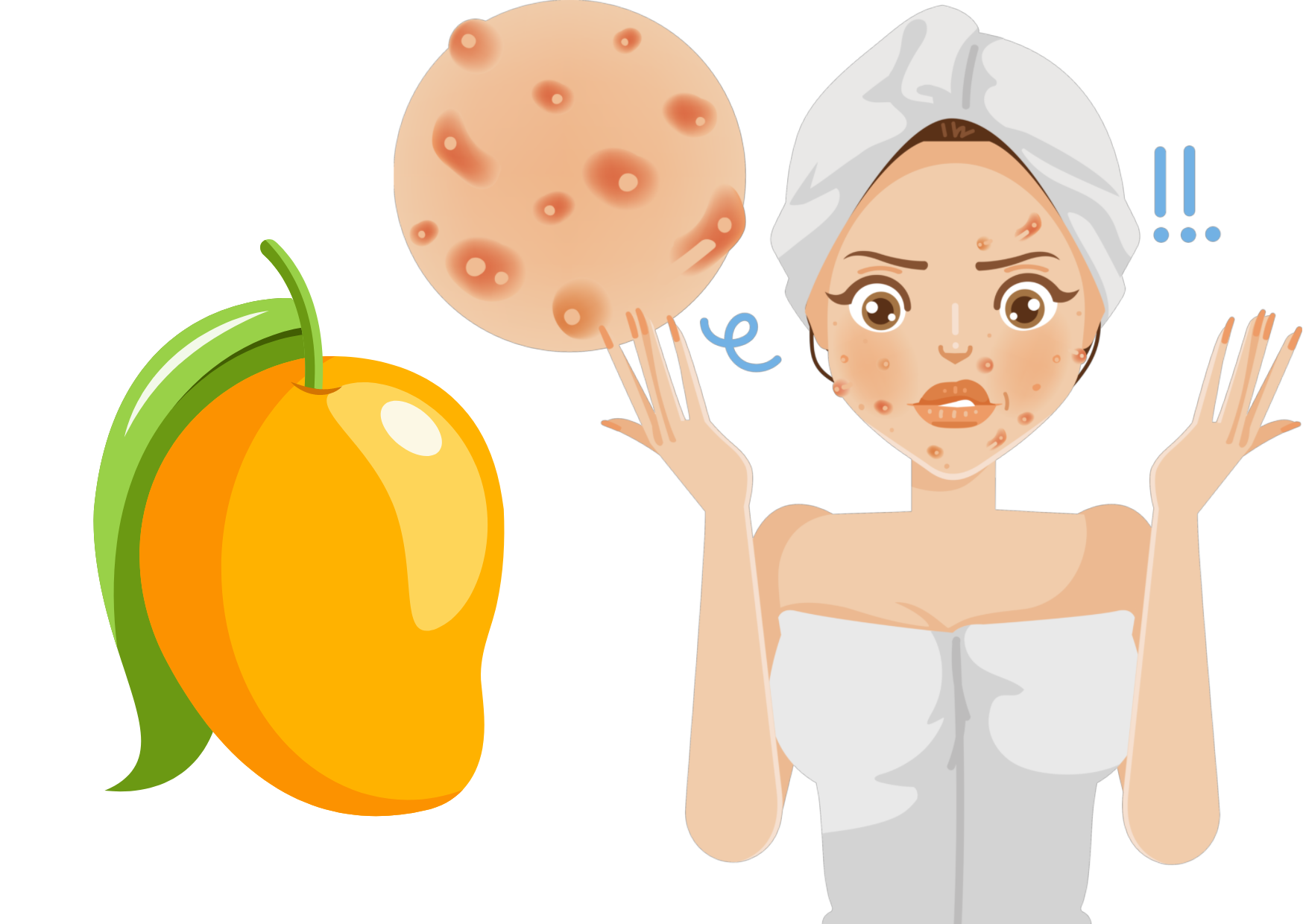Does Eating Mango Cause Acne? Unveiling The Truth
Does eating mango cause acne? This question has sparked curiosity among health-conscious individuals and skincare enthusiasts alike. Mangoes, often referred to as the "king of fruits," are beloved for their sweet taste, vibrant color, and impressive nutritional profile. However, some people believe that indulging in this tropical delight may lead to acne breakouts. In this article, we will dive deep into the relationship between mango consumption and acne, separating myths from facts while providing actionable insights for maintaining healthy skin and a balanced diet.
Acne is a common skin condition that affects millions of people worldwide, regardless of age or gender. While hormonal fluctuations, genetics, and lifestyle factors are well-known contributors to acne, diet has also been a subject of debate in recent years. Mangoes, being rich in natural sugars and certain compounds, have often been scrutinized for their potential role in triggering acne. Understanding whether this claim holds any scientific merit requires a closer look at the nutritional composition of mangoes and their impact on skin health.
In this article, we will explore the science behind acne formation, analyze the effects of mangoes on the body, and provide evidence-based answers to the question, does eating mango cause acne? By the end of this article, you will have a clear understanding of whether mangoes deserve a spot in your diet or if they should be consumed in moderation to maintain clear, glowing skin.
Table of Contents
- Understanding Acne: Causes and Triggers
- The Nutritional Profile of Mangoes
- How Mangoes Affect Skin Health
- The Sugar Content in Mangoes and Its Impact
- Scientific Research on Diet and Acne
- The Importance of Moderation in Mango Consumption
- Tips for Maintaining Clear Skin While Enjoying Mangoes
- Common Myths About Mangoes and Acne Debunked
- Healthy Alternatives to Mangoes for Skin-Friendly Snacking
- Conclusion: Does Eating Mango Cause Acne?
Understanding Acne: Causes and Triggers
Acne is a multifactorial skin condition that occurs when hair follicles become clogged with oil, dead skin cells, and bacteria. It commonly manifests as pimples, blackheads, whiteheads, or cysts, and can appear on the face, back, chest, and shoulders. While acne is most prevalent during puberty due to hormonal changes, it can affect individuals of all ages. Understanding the primary causes and triggers of acne is essential for addressing this issue effectively.
Hormonal Factors
Hormonal fluctuations play a significant role in acne development. During puberty, increased levels of androgens stimulate the sebaceous glands to produce more oil, leading to clogged pores. Similarly, hormonal changes during menstruation, pregnancy, or menopause can also trigger acne in women. Stress, another factor that affects hormone levels, can exacerbate acne by increasing cortisol production.
Dietary Influences
While the relationship between diet and acne is still being studied, certain foods have been linked to acne flare-ups. High-glycemic foods, such as sugary snacks and refined carbohydrates, can spike blood sugar levels and trigger inflammation, potentially worsening acne. Dairy products have also been associated with acne due to their hormone content. However, the role of fruits like mangoes in acne development remains a topic of debate.
The Nutritional Profile of Mangoes
Mangoes are not only delicious but also packed with essential nutrients that benefit overall health. Understanding their nutritional composition can help us evaluate their potential impact on skin health and acne.
Vitamins and Antioxidants
Mangoes are rich in vitamins A, C, and E, all of which play crucial roles in maintaining healthy skin. Vitamin A supports cell growth and repair, while vitamin C boosts collagen production and protects the skin from oxidative stress. Vitamin E, a powerful antioxidant, helps combat free radicals that can damage skin cells and contribute to premature aging.
Fiber and Natural Sugars
Mangoes contain dietary fiber, which aids digestion and promotes gut health. A healthy gut is often linked to clearer skin, as poor digestion can lead to toxin buildup and inflammation. However, mangoes are also high in natural sugars, primarily fructose, which can raise blood sugar levels if consumed in excess. This aspect of mangoes has raised concerns about their potential impact on acne.
How Mangoes Affect Skin Health
The effects of mangoes on skin health are multifaceted. While their nutrient-rich profile offers several benefits, certain factors may warrant caution for individuals prone to acne.
Benefits for Skin
Mangoes are hydrating and contain compounds that promote skin hydration and elasticity. Their high vitamin C content supports collagen synthesis, which helps maintain firm and youthful skin. Additionally, the antioxidants in mangoes can reduce inflammation and protect the skin from environmental damage, potentially reducing the risk of acne scars.
Potential Concerns
Despite their benefits, mangoes' high sugar content may pose challenges for acne-prone individuals. Excessive sugar consumption can lead to insulin spikes, which may increase sebum production and inflammation—two key factors in acne development. However, it is important to note that moderate consumption of mangoes is unlikely to cause significant issues for most people.
The Sugar Content in Mangoes and Its Impact
The sugar content in mangoes has been a point of concern for those exploring the link between mango consumption and acne. Understanding how natural sugars affect the body can provide clarity on this issue.
Glycemic Index of Mangoes
Mangoes have a moderate glycemic index (GI), meaning they can cause a gradual rise in blood sugar levels rather than a sudden spike. Foods with a high GI are more likely to trigger acne by promoting inflammation and increasing insulin levels. Since mangoes fall in the moderate range, they are less likely to have a significant impact on acne compared to high-GI foods like candy or soda.
Balancing Mango Consumption
To minimize the potential impact of mangoes' sugar content on acne, it is advisable to consume them in moderation. Pairing mangoes with foods rich in protein or healthy fats, such as nuts or yogurt, can help stabilize blood sugar levels and reduce the risk of insulin spikes.
Scientific Research on Diet and Acne
While anecdotal evidence often links certain foods to acne, scientific research provides a more nuanced understanding of this relationship. Let us explore what studies reveal about diet and acne.
Studies on High-Glycemic Foods
Several studies have shown that high-glycemic diets are associated with an increased risk of acne. These diets can lead to elevated insulin levels, which may stimulate oil production and inflammation in the skin. However, mangoes, with their moderate GI, are unlikely to have the same effect as high-GI foods.
Role of Antioxidants
Research highlights the importance of antioxidants in managing acne. Antioxidant-rich foods, such as mangoes, can reduce oxidative stress and inflammation, potentially improving skin health. This suggests that mangoes may have a neutral or even positive impact on acne when consumed responsibly.
The Importance of Moderation in Mango Consumption
Moderation is key when it comes to enjoying mangoes without compromising skin health. While mangoes are nutritious, overindulgence can lead to unwanted effects, particularly for acne-prone individuals.
Recommended Serving Sizes
Nutritionists recommend consuming no more than one cup of mango slices (approximately 165 grams) per day. This portion provides ample nutrients without overwhelming the body with excess sugar. Sticking to this guideline can help you enjoy the benefits of mangoes while minimizing potential risks.
Incorporating Mangoes into a Balanced Diet
To maintain a balanced diet, pair mangoes with other nutrient-dense foods. For example, adding mango slices to a salad or blending them into a smoothie with spinach and almond milk can create a skin-friendly meal. This approach ensures you reap the benefits of mangoes without overdoing it.
Tips for Maintaining Clear Skin While Enjoying Mangoes
If you love mangoes but are concerned about acne, here are some practical tips to help you enjoy them while maintaining clear skin:
- Stay Hydrated: Drink plenty of water to flush out toxins and support skin hydration.
- Practice Good Skincare: Use non-comedogenic products and cleanse your skin regularly to prevent clogged pores.
- Monitor Your Diet: Keep a food diary to identify any dietary triggers that may worsen your acne.
- Exercise Regularly: Physical activity can improve circulation and reduce stress, both of which benefit skin health.
Common Myths About Mangoes and Acne Debunked
Several myths surround the relationship between mangoes and acne. Let us debunk some of the most common misconceptions:
Myth 1: Mangoes Directly Cause Acne
There is no scientific evidence to suggest that mangoes directly cause acne. While their sugar content may contribute to insulin spikes in excess, moderate consumption is unlikely to trigger breakouts.
Myth 2: Avoiding Mangoes Guarantees Clear Skin
Acne is influenced by multiple factors, including genetics, hormones, and lifestyle. Simply avoiding mangoes will not guarantee clear skin, as other dietary and environmental factors also play a role.
Healthy Alternatives to Mangoes for Skin-Friendly Snacking
If you are looking for skin-friendly fruits to complement or replace mangoes, consider the following options:
- Berries: Low in sugar and high in antioxidants, berries like blueberries and strawberries are excellent choices for acne-prone individuals.
- Apples: With their high fiber content and low GI, apples make a great snack for maintaining stable blood sugar levels.
- Kiwifruit: Rich in vitamin C and fiber, kiwifruit supports skin health and digestion.
Conclusion: Does Eating Mango Cause Acne?
In conclusion, the claim that eating mango causes acne is largely a myth. While mangoes contain natural sugars that may contribute to insulin spikes if consumed in excess, their moderate glycemic index and nutrient-rich profile make them a generally safe choice for most people. The key lies in moderation and balance, ensuring that mangoes are part of a well-rounded diet that supports overall health and skin wellness.
If you are prone to acne, it is essential to monitor your diet and skincare routine to identify potential triggers. Remember, no single food is responsible for acne—instead, focus on maintaining a healthy lifestyle that includes a balanced diet, regular exercise, and proper skincare practices. We encourage you to share your thoughts or experiences in the comments below and explore other articles on our site for more insights into health and wellness. Happy snacking!


Detail Author:
- Name : Prof. Devonte Rowe PhD
- Username : walker.houston
- Email : cordie79@yahoo.com
- Birthdate : 1987-04-21
- Address : 6876 Beatty Center Apt. 951 Lake Sophie, RI 93446
- Phone : +1 (364) 983-4709
- Company : Fadel, McClure and Stanton
- Job : Computer Programmer
- Bio : Aut id non qui quia. Voluptas tempora est assumenda nihil quis veritatis. Est consequatur nobis fugiat unde amet.
Socials
tiktok:
- url : https://tiktok.com/@robert_xx
- username : robert_xx
- bio : Est et ullam ex odit veniam velit similique.
- followers : 3486
- following : 1364
linkedin:
- url : https://linkedin.com/in/robert_dev
- username : robert_dev
- bio : Magnam voluptatem expedita et cupiditate enim.
- followers : 6347
- following : 1664
twitter:
- url : https://twitter.com/gottlieb1978
- username : gottlieb1978
- bio : Hic ratione et et nam. Non fugiat aut corporis eos.
- followers : 1958
- following : 2562
facebook:
- url : https://facebook.com/gottlieb1996
- username : gottlieb1996
- bio : Odio aliquam corrupti non odit eos accusamus.
- followers : 2398
- following : 2044
instagram:
- url : https://instagram.com/robert_gottlieb
- username : robert_gottlieb
- bio : Excepturi voluptatem omnis quasi ducimus. Eaque vel occaecati quia et.
- followers : 2396
- following : 430